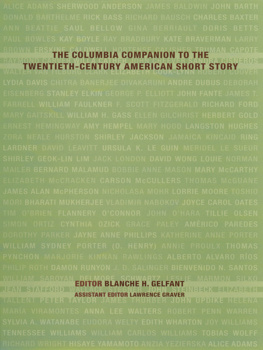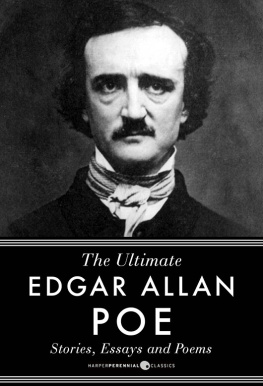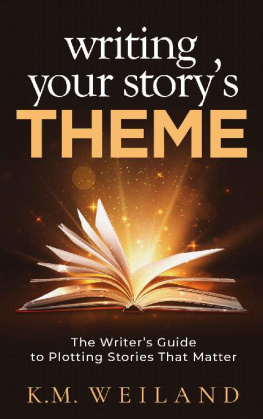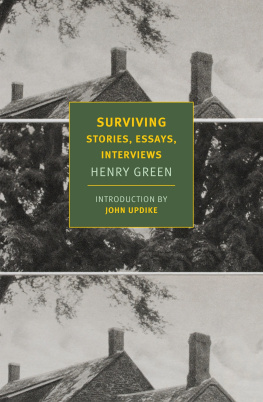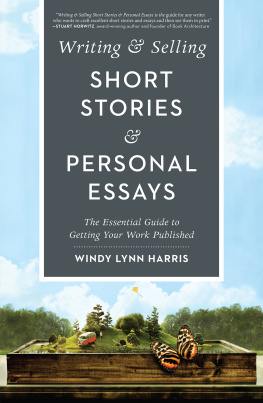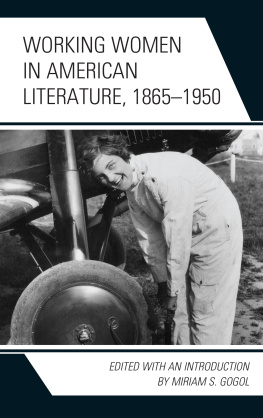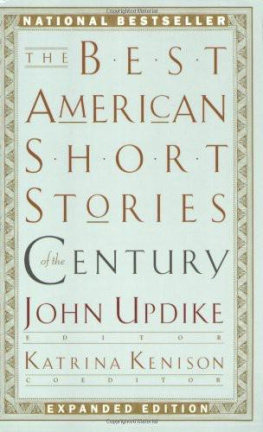THE
COLUMBIA COMPANION
TO THE
TWENTIETH-CENTURY
AMERICAN SHORT STORY
THE
COLUMBIA COMPANION
TO THE
TWENTIETH-CENTURY
AMERICAN SHORT STORY
Blanche H. Gelfant, Editor
Lawrence Graver, Assistant Editor

Columbia university press
new york
Columbia University Press
Publishers Since 1893
New York Chichester, West Sussex
cup.columbia.edu
Copyright 2000 Columbia University Press
All rights reserved
E-ISBN 978-0-231-50495-9
Library of Congress Cataloging-in-Publication Data
The Columbia companion to the twentieth-century American short story / Blanche H. Gelfant, editor.
p. cm.
Includes bibliographical references and index.
ISBN 0231110987 (cloth : alk. paper)
1. Short stories, AmericanDictionaries. 2. American fiction20th centuryDictionaries. 3. Short stories, AmericanBio-bibliographyDictionaries. 4. American fiction20th centuryBio-bibliographyDictionaries. 5. Authors, American20th centuryBiographyDictionaries. I. Title: Columbia companion to the 20th century American short story. II. Gelfant, Blanche H., 1922
PS374.S5 C57 2001
831 .010905dc21
00031610
Designed by Chang Jae Lee
A Columbia University Press E-book.
CUP would be pleased to hear about your reading experience with this e-book at .
CONTENTS
CONTRIBUTORS
Kerry Ahearn
Oregon State University
Dale M. Bauer
University of Kentucky
Jonathan Baumbach
Brooklyn College
Robert Bell
Williams College
Lauren Berlant
University of Chicago
Erik Bledsoe
University of Tennessee
Kasia Boddy
University College, London
Jane Bradley
University of Toledo
Leonor Briscoe
Burke, Virginia
Suzanne Hunter Brown
Dartmouth College
Emily Budick
Hebrew University of Jerusalem
John Burt
Brandeis University
Robert Caserio
Temple University
Maria Elena Cepeda
University of Michigan
Nancy Cook
University of Rhode Island
Robert Corber
Trinity College
John Crawford
University of New Mexico
Elizabeth Cummins
University of Missouri
Morris Dickstein
City University of New York
Arthur Edelstein
Radcliffe Institute for Advanced Study
Stephen E. Fix
Williams College
Edward Foster
Stevens Institute of Technology
Robert Fox
Columbus, Ohio
Rhonda Frederick
Boston College
Andrew Furman
Florida Atlantic University
Fred Gardaphe
State University of New York at Stony Brook
Blanche H. Gelfant
Hanover, New Hampshire
Melody Graulich
Utah State University
Lawrence Graver
Williams College
Joan Wylie Hall
University of Mississippi
James Hannah
Texas A&M University
Donna Akiba Sullivan Harper
Decatur, Georgia
Tobey Herzog
Wabash College
Eric Heyne
University of Alaska, Fairbanks
Allen Hibbard
Middle Tennessee State University
Molly Hite
Cornell University
Greg Johnson
Kennesaw State University
Carla Kaplan
University of Southern California
Alice Kessler-Harris
Columbia University
Michelle Latiolais
University of California, Irvine
Luis Leal
University of California, Santa Barbara
Shirley Geok-lin Lim
University of California, Santa Barbara
Amy Ling
University of Wisconsin
Glen Love
University of Oregon
Wendy Martin
Claremont Graduate University
Peter Mascuch
University of New Hampshire
Charlotte S. McClure
Atlanta, Georgia
Lee Mitchell
Princeton University
David Mogen
Colorado State University
John Murphy
Brigham Young University
James Nagel
University of Georgia
Jay Parini
Middlebury College
Richard Pearce
Wheaton College
Sanford Pinsker
Franklin and Marshall University
Donald Pizer
Tulane University
Horace Porter
University of Iowa
Ruth Prigozy
Hofstra University
Janet R. Raiffa
New York, New York
Josna Rege
Dartmouth College
Russell Reising
University of Toledo
Gary Richards
University of New Orleans
Julie Rivkin
Connecticut College
Deborah Rosenfelt
University of Maryland
James Ruppert
University of Alaska, Fairbanks
Roshni Rustomji-Kerns
Stanford University
Elaine Safer
University of Delaware
Ramon Saldvar
Stanford University
Geoffrey Sanborn
Williams College
Gary Scharnhorst
University of New Mexico
John Seelye
University of Florida
Sofia Shafquat
Encinitas, California
Mark Shechner
State University of New York at Buffalo
Karen Shepard
Williams College
Ben Siegel
California State Polytechnic University
David L. Smith
Williams College
Larry Smith
Firelands College of Bowling Green State University
Werner Sollors
Harvard University
Silvia Spitta
Dartmouth College
Phillip Stambovsky
New Haven, Connecticut
David Stouck
Simon Fraser University
Rodger L. Tarr
Illinois State University
James Warren
Columbia University Press
Dennis Washburn
Dartmouth College
Barry Weller
University of Utah
Max Westbrook
University of Texas, Austin
Kenny Williams
Duke University
Mary Ann Wilson
University of Louisiana at Lafayette
Norma C. Wilson
University of South Dakota
Mary Ann Wimsatt
University of South Carolina
Dede Yow
Kennesaw State University
Zhou Xiaojing
State University of New York at Buffalo
A story can open us up, by cut or caress, to a new truth.
Andre Dubus
D esignated a companion to the twentieth-century American short story, this collection of essays is both an accessory to the stories and writers it presents and a guide. As accessory or aide, it accompanies the stories, providing information about their writers lives and literary achievements. As a guide, it points out literary paths taken by American writers whose works are admired throughout the world. By necessity, it has left many roads untraveled. Readers may wish that the Columbia Companion could have pursued these paths, some of them paved recently by best-selling young storytellers such as Nathan Englander and Melissa Bank, whose work appeared after this book went to press, as did the prize-winning stories of Barbara Mujica and Judy Doenges. Their absence and that of certain older, established writers argues for a sequel to The Columbia Companion to the Twentieth-Century American Short Story, a project perhaps for the twenty-first century.
Each of the essays is self-contained and can be read singly or in any sequence. However, if read chronologically, according to the writers dates, the collected essays trace a history of the short storys development from the beginning of the century to the present, from Jack London and O. Henry to Andre Dubus, Joy Williams, Tobias Wolff, Deborah Eisenberg, David Leavitt, Lydia Davis, Nicholasa Mohr, Amrico Paredes, and a dazzling diversity of others. Two sets of essays suggest this diversity: thematic essays that group together stories sharing a particular motif, cultural identity, or literary practice; and biographical essays, the body of the book, that focus on individual writers and their work. Writers mentioned in the thematic essaysLangston Hughes, Bernard Malamud, or Sandra Cisneros, for instancemay reappear in a biographical essay. Thus they are both contextualized and particularized, placed within a literary group and presented as unique artists.
Next page
